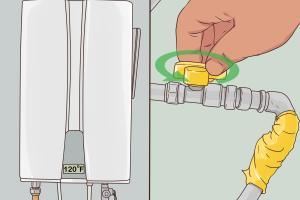Step-by-Step Guide: How to Turn on Your Water Heater Safely and Efficiently

-
Quick Links:
- Introduction
- Types of Water Heaters
- Safety First
- Preparation Steps
- Turning on an Electric Water Heater
- Turning on a Gas Water Heater
- Troubleshooting Common Issues
- Case Studies
- Expert Insights
- FAQs
Introduction
Water heaters are essential for comfortable living, providing hot water for showers, dishwashing, and laundry. However, many homeowners may find it daunting when it comes time to turn on their water heater, especially if they have never done it before. This guide will provide you with all the necessary information to safely and effectively turn on your water heater.
Types of Water Heaters
Before diving into the steps to turn on a water heater, it's essential to understand the different types of water heaters available:
- Tank Water Heaters: These are the most common types, storing a specific amount of hot water for immediate use.
- Tankless Water Heaters: These heaters provide hot water on demand without storing it in a tank.
- Heat Pump Water Heaters: Utilizing electricity to move heat from one place to another, these heaters are highly efficient.
- Solar Water Heaters: These rely on solar panels to heat water, making them environmentally friendly.
Safety First
Turning on a water heater involves working with electricity or gas, so safety should always be your priority. Here are some essential safety precautions:
- Always consult the manufacturer’s manual before proceeding.
- Ensure the area around the water heater is well-ventilated.
- Wear protective gear, such as gloves and goggles.
- For gas heaters, check for gas leaks before turning on the unit.
Preparation Steps
Before turning on your water heater, follow these preparation steps:
- Check the water supply to ensure it’s connected.
- Inspect the heater for any visible damage.
- Ensure the thermostat is set to the desired temperature (typically 120°F).
Turning on an Electric Water Heater
Turning on an electric water heater is a straightforward process. Follow these steps:
- Locate the power switch, typically near the heater.
- Ensure the water supply is connected and the tank is filled.
- Turn on the power switch. The indicator light should turn on, signaling that the unit is heating.
- Wait for about 30 minutes to an hour for the water to reach the desired temperature.
Turning on a Gas Water Heater
For gas water heaters, follow these steps to turn it on safely:
- Locate the gas valve and ensure it’s set to the “Pilot” position.
- Press down on the pilot button and light the pilot flame using a long lighter.
- Once the pilot is lit, release the button and turn the gas valve to the “On” position.
- Check for any gas leaks around the valve.
- Wait for the water to heat up, which may take a bit longer than electric heaters.
Troubleshooting Common Issues
If you encounter issues while trying to turn on your water heater, here are some common problems and solutions:
- No hot water: Check if the heater is receiving power or if the gas supply is turned on.
- Strange noises: Sediment buildup may cause noise; consider flushing the tank.
- Water leaks: Inspect connections and seals for wear and tear.
Case Studies
Many homeowners face challenges when turning on their water heaters for the first time. Here are a couple of case studies that illustrate common scenarios:
Case Study 1: First-Time Homeowner
A first-time homeowner faced difficulties in turning on a gas water heater. After following a step-by-step guide, they realized that the gas supply was turned off. Once they contacted a professional for gas line inspection, they successfully turned on the heater.
Case Study 2: Sediment Buildup
A homeowner reported a loud rumbling noise from their electric water heater. After consulting an expert, they learned that a sediment buildup was the culprit. They flushed the tank, which resolved the issue and improved efficiency.
Expert Insights
We reached out to plumbing experts for insights on water heater maintenance:
“Regular maintenance, including flushing your water heater annually, can prolong its lifespan and save you money in energy costs.” – John Smith, Plumbing Expert
FAQs
Here are some frequently asked questions related to turning on a water heater:
1. How do I know if my water heater needs repair?
If you notice leaks, inconsistent temperatures, or strange noises, it may be time to consult a professional.
2. Can I turn on a gas water heater without a pilot light?
No, the pilot light must be on for a gas water heater to function.
3. How long does it take for a water heater to heat up?
Electric heaters can take 30-60 minutes, while gas heaters may take a bit longer, depending on the tank size.
4. Is it safe to turn on a water heater if it’s leaking?
No, you should address any leaks before attempting to turn on the water heater.
5. What temperature should I set my water heater?
The recommended setting is typically around 120°F for safe and efficient operation.
6. How often should I flush my water heater?
Flushing your water heater once a year can help maintain its efficiency.
7. What should I do if my water heater won’t turn on?
Check the power supply, gas valve, and look for any visible issues before consulting a professional.
8. Can I light the pilot light with a match?
It’s safer to use a long lighter specifically designed for this purpose to avoid burns.
9. What should I do if I smell gas?
Immediately turn off the gas supply, evacuate the area, and contact your gas company.
10. Are there any eco-friendly water heater options?
Yes, consider tankless or solar water heaters for energy efficiency and reduced environmental impact.